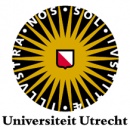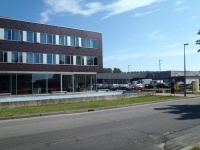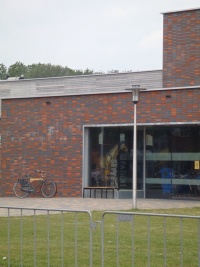Difference between revisions of "Netherlands - Universiteit Utrecht Faculty of Veterinary Medicine"
Ggaitskell (talk | contribs) |
|||
| (13 intermediate revisions by 3 users not shown) | |||
| Line 1: | Line 1: | ||
| − | + | {{Vetschool | |
| − | + | |Introduction=The [http://www.uu.nl/faculty/veterinarymedicine/EN/Pages/default.aspx Faculty of Veterinary Medicine] at Utrecht University is the only place in the Netherlands where veterinarians are trained. This means that the Faculty is the centre of expertise and point of reference for veterinary issues for the entire country, and increasingly for the world abroad as well. Activities include providing primary health and welfare care for a variety of types of animals, monitoring food safety and the prevention of zoonoses. | |
| − | + | |History=In 1821, due to the general lack of knowledge about veterinary health, the National Veterinary School was founded in Utrecht. The founders hoped that the scientifically trained veterinarians would be able to cure diseases in livestock, as there had been three large epidemics of cattle plague in the 18th century. The school also trained 'horse doctors', which where desperately needed in the army. | |
| − | + | [[File:MartinusdeBruinsmall.jpg|200px|thumb|left|Martinus de Bruingebouw: Department of veterinary health care for farm animals]] | |
| − | |||
| − | |||
| − | |||
| − | |||
| − | |||
| − | |||
| − | |||
| − | |||
| − | |||
| − | |||
| − | |||
| − | In 1821, due to the general lack of knowledge about veterinary health, the National Veterinary School was founded in Utrecht. The founders hoped that the scientifically trained veterinarians would be able to cure diseases in livestock, as there had been three large epidemics of cattle plague in the 18th century. The school also trained 'horse doctors', which where desperately needed in the army. | ||
Primarily due to the scientific developments in veterinary medicine, such as effective therapies and vaccines, veterinary medicine became a respected profession around 1910. Later the profession expanded to include care for small pets and quality control for meat and dairy products. Also education improved, in 1918 the school changed its name to the Veterinary College, and in 1925 it became the Veterinary Faculty of the State University of Utrecht. | Primarily due to the scientific developments in veterinary medicine, such as effective therapies and vaccines, veterinary medicine became a respected profession around 1910. Later the profession expanded to include care for small pets and quality control for meat and dairy products. Also education improved, in 1918 the school changed its name to the Veterinary College, and in 1925 it became the Veterinary Faculty of the State University of Utrecht. | ||
| + | <br><br> | ||
Around 1960 the demand for veterinarians increased significantly. The faculty outgrew its home in the city centre of Utrecht and moved to an expansive and modern facility on the Uithof university campus. | Around 1960 the demand for veterinarians increased significantly. The faculty outgrew its home in the city centre of Utrecht and moved to an expansive and modern facility on the Uithof university campus. | ||
| − | + | <br><br> | |
| − | + | |Education=The faculty of veterinary medicine mainly provides education for the training of veterinarians of general profile. The Utrecht veterinary curriculum is accredited by the Dutch Flemish Accreditation Organisation (NVAO), the American and Canadian Veterinary Medical Associations (A/CVMA) and the European Association of Establishments for Veterinary Education. The Dutch Ministry of Education has declared the so-called numerus fixus applicable to the study of Veterinary Medicine. This entails that only a limited amount of students will be admitted each year. At this moment, the number is 225. | |
| − | The faculty of veterinary medicine mainly provides education for the training of veterinarians of general profile. The Utrecht veterinary curriculum is accredited by the Dutch Flemish Accreditation Organisation (NVAO), the American and Canadian Veterinary Medical Associations (A/CVMA) and the European Association of Establishments for Veterinary Education. The Dutch Ministry of Education has declared the so-called numerus fixus applicable to the study of Veterinary Medicine. This entails that only a limited amount of students will be admitted each year. At this moment, the number is 225. | + | <br><br> |
The faculty also provides in post-academic education. The postgraduate master currently encompasses Veterinary Epidemiology and Economics, Veterinary and Molecular Pathology and Animal Welfare. Other postgraduate possibilities are PhD training or specialist training. The faculty also participates in the foundation ''Post Academic Education in Veterinary Medicine''. | The faculty also provides in post-academic education. The postgraduate master currently encompasses Veterinary Epidemiology and Economics, Veterinary and Molecular Pathology and Animal Welfare. Other postgraduate possibilities are PhD training or specialist training. The faculty also participates in the foundation ''Post Academic Education in Veterinary Medicine''. | ||
| + | <br><br> | ||
In september 2007 the faculty started the first curriculum of the new BaMa system. The three-year undergraduate course (bachelor) provides for the more clinical three-year graduate course (master). In the undergraduate course students learn the basics of veterinary medicine, educated in themes. In the graduate course, students choose their future workfield (companion-animals, farm-animals or horses) and they follow training courses in the faculty clinics. | In september 2007 the faculty started the first curriculum of the new BaMa system. The three-year undergraduate course (bachelor) provides for the more clinical three-year graduate course (master). In the undergraduate course students learn the basics of veterinary medicine, educated in themes. In the graduate course, students choose their future workfield (companion-animals, farm-animals or horses) and they follow training courses in the faculty clinics. | ||
| − | + | |Research=The faculty of Veterinary Medicine performs fundamental and strategic research focused on health, disease and wellbeing of animals and on related public and environmental health aspects. | |
| − | + | <br><br> | |
| − | + | Research is organized in five thematic interdisciplinary research programs with the purpose to promote scientific innovation at the interface between disciplines and to create a challenging research environment for high potential scientists. The thematic research programs are embedded in research focus areas of Utrecht University; interfacultary multidisciplinary clusters bringing together top-class research groups in thematic priority fields. | |
| − | + | <br><br> | |
| − | Utrecht faculty of veterinary medicine provides veterinary care in three clinics: the university clinic for companion animals, the equine university clinic and the ambulatory clinic for farm animals. In most cases is a referral from the local veterinarian necessary to make an appointment at one of the clinics. | + | The research programmes are ''Biology of Reproductive Cells'', ''Tissue Repair'', ''Emotion and Cognition'', ''Risk Assessment of Toxic and Immunomodulatory Agents'', ''Strategic Infection Biology'' and ''Advances in Veterinary Medicine''. |
| − | + | <br><br> | |
| − | The | + | The faculty’s research institute ''the Institute of Veterinary Research (IVR)'' covers all research performed at the faculty of Veterinary Medicine, including the interfacultary ''Institute for Risk Assessment Sciences''. |
| − | + | |Clinical=Utrecht faculty of veterinary medicine provides veterinary care in three clinics: the university clinic for companion animals, the equine university clinic and the ambulatory clinic for farm animals. In most cases is a referral from the local veterinarian necessary to make an appointment at one of the clinics. | |
| + | [[File:Donkervoetsmall.jpg|200px|thumb|left|Jeannette Donkervoetgebouw: University Veterinary Diagnostic Laboratory and Pharmacy]] | ||
| + | The University Clinic for Companion Animals provides veterinary care for companion animals in a range of disciplines, namely general internal medicine, cardiology-pulmonology, dermatology, endocrinology, gastro-enterology, hematology, hepatology, nefrology, neurology, oncology, reproduction, general surgery, orthopaedic surgery, neurological surgery, dentistry, ophthalmology, anesthesiology, diagnostic imaging, clinical nutrition and radiotherapy. Special divisions are the emergency clinic, animal behaviour clinic and department of birds and special companion animals (rodents, reptiles, amphibians and ferrets) | ||
| + | [[File:Schimmelgebouwsmall.jpg|200px|thumb|right|Willem Schimmelgebouw: Equine clinic]] | ||
The Equine Clinic is the academic veterinary hospital specialised in treatment and care of horses and other equines (ponies, zebras and donkeys). It provides high quality veterinary medical care thanks to a unique combination of specialists, excellent facilities and a broad programme of clinical scientific research. Special departments are the reproduction department and the foal brigade. | The Equine Clinic is the academic veterinary hospital specialised in treatment and care of horses and other equines (ponies, zebras and donkeys). It provides high quality veterinary medical care thanks to a unique combination of specialists, excellent facilities and a broad programme of clinical scientific research. Special departments are the reproduction department and the foal brigade. | ||
| − | ==School | + | |Image3=Yalelaansmall.jpg |
| − | Faculty of veterinary medicine, Universiteit Utrecht | + | |Image2=Androclus_klein.jpg |
| + | |MainImage=Utrecht1.jpg | ||
| + | |School=Faculty of veterinary medicine, Universiteit Utrecht | ||
| + | |Established=1821 | ||
| + | |Location=Utrecht, Netherlands | ||
| + | |Principal= Prof. Dr. A. Pijpers | ||
| + | |Students=~1600 | ||
| + | |Undergraduates= | ||
| + | |Postgraduates= | ||
| + | |Website=http://www.uu.nl/faculty/veterinarymedicine/EN/Pages/default.aspx | ||
| + | |Contact= '''Visitor's address''': | ||
| + | Faculty of Veterinary Medicine | ||
| + | <br>Androclus Building | ||
| + | <br>Yalelaan 1, De Uithof | ||
| + | <br>3584 CL Utrecht | ||
| + | <br>The Netherlands | ||
| − | + | <br>'''Post address''': | |
| − | + | <br>Faculty of Veterinary Medicine | |
| + | <br>P.O. Box 80.163 | ||
| + | <br>3508 TD Utrecht | ||
| + | <br>The Netherlands | ||
| − | = | + | '''Tel''': +31 (0)30 253 90 00 |
| − | + | |Student Ambassador=[[User:Lubuniversiteit|Lubberta de Jong]] and Pim Polak | |
| + | }} | ||
| − | == | + | ===For more information on the Faculty's study programmes and informational activities:=== |
| − | + | <br>Telephone: (030) 253 48 58 (Monday to Thursday 09:00 – 10:00) | |
| − | + | <br>Address: Postbus 80163, 3508 TD Utrecht | |
| − | |||
| − | |||
| − | |||
| − | |||
| − | |||
| − | |||
| − | |||
| − | |||
| − | |||
| − | |||
| − | |||
| − | |||
| − | |||
| − | |||
| − | |||
| − | |||
| − | |||
| − | |||
| − | |||
| − | |||
| − | |||
| − | |||
| − | 3508 TD Utrecht | ||
| − | |||
| − | + | [[Category:Europe]] | |
| − | |||
| − | |||
Latest revision as of 09:16, 21 August 2012
| ||||||||||||||||
| ||||||||||||||||
The Faculty of Veterinary Medicine at Utrecht University is the only place in the Netherlands where veterinarians are trained. This means that the Faculty is the centre of expertise and point of reference for veterinary issues for the entire country, and increasingly for the world abroad as well. Activities include providing primary health and welfare care for a variety of types of animals, monitoring food safety and the prevention of zoonoses.
About Us
In 1821, due to the general lack of knowledge about veterinary health, the National Veterinary School was founded in Utrecht. The founders hoped that the scientifically trained veterinarians would be able to cure diseases in livestock, as there had been three large epidemics of cattle plague in the 18th century. The school also trained 'horse doctors', which where desperately needed in the army.
Primarily due to the scientific developments in veterinary medicine, such as effective therapies and vaccines, veterinary medicine became a respected profession around 1910. Later the profession expanded to include care for small pets and quality control for meat and dairy products. Also education improved, in 1918 the school changed its name to the Veterinary College, and in 1925 it became the Veterinary Faculty of the State University of Utrecht.
Around 1960 the demand for veterinarians increased significantly. The faculty outgrew its home in the city centre of Utrecht and moved to an expansive and modern facility on the Uithof university campus.
Education
The faculty of veterinary medicine mainly provides education for the training of veterinarians of general profile. The Utrecht veterinary curriculum is accredited by the Dutch Flemish Accreditation Organisation (NVAO), the American and Canadian Veterinary Medical Associations (A/CVMA) and the European Association of Establishments for Veterinary Education. The Dutch Ministry of Education has declared the so-called numerus fixus applicable to the study of Veterinary Medicine. This entails that only a limited amount of students will be admitted each year. At this moment, the number is 225.
The faculty also provides in post-academic education. The postgraduate master currently encompasses Veterinary Epidemiology and Economics, Veterinary and Molecular Pathology and Animal Welfare. Other postgraduate possibilities are PhD training or specialist training. The faculty also participates in the foundation Post Academic Education in Veterinary Medicine.
In september 2007 the faculty started the first curriculum of the new BaMa system. The three-year undergraduate course (bachelor) provides for the more clinical three-year graduate course (master). In the undergraduate course students learn the basics of veterinary medicine, educated in themes. In the graduate course, students choose their future workfield (companion-animals, farm-animals or horses) and they follow training courses in the faculty clinics.
Current Research
The faculty of Veterinary Medicine performs fundamental and strategic research focused on health, disease and wellbeing of animals and on related public and environmental health aspects.
Research is organized in five thematic interdisciplinary research programs with the purpose to promote scientific innovation at the interface between disciplines and to create a challenging research environment for high potential scientists. The thematic research programs are embedded in research focus areas of Utrecht University; interfacultary multidisciplinary clusters bringing together top-class research groups in thematic priority fields.
The research programmes are Biology of Reproductive Cells, Tissue Repair, Emotion and Cognition, Risk Assessment of Toxic and Immunomodulatory Agents, Strategic Infection Biology and Advances in Veterinary Medicine.
The faculty’s research institute the Institute of Veterinary Research (IVR) covers all research performed at the faculty of Veterinary Medicine, including the interfacultary Institute for Risk Assessment Sciences.
Clinical Services
Utrecht faculty of veterinary medicine provides veterinary care in three clinics: the university clinic for companion animals, the equine university clinic and the ambulatory clinic for farm animals. In most cases is a referral from the local veterinarian necessary to make an appointment at one of the clinics.
The University Clinic for Companion Animals provides veterinary care for companion animals in a range of disciplines, namely general internal medicine, cardiology-pulmonology, dermatology, endocrinology, gastro-enterology, hematology, hepatology, nefrology, neurology, oncology, reproduction, general surgery, orthopaedic surgery, neurological surgery, dentistry, ophthalmology, anesthesiology, diagnostic imaging, clinical nutrition and radiotherapy. Special divisions are the emergency clinic, animal behaviour clinic and department of birds and special companion animals (rodents, reptiles, amphibians and ferrets)
The Equine Clinic is the academic veterinary hospital specialised in treatment and care of horses and other equines (ponies, zebras and donkeys). It provides high quality veterinary medical care thanks to a unique combination of specialists, excellent facilities and a broad programme of clinical scientific research. Special departments are the reproduction department and the foal brigade.
View other vet schools
For more information on the Faculty's study programmes and informational activities:
Telephone: (030) 253 48 58 (Monday to Thursday 09:00 – 10:00)
Address: Postbus 80163, 3508 TD Utrecht





